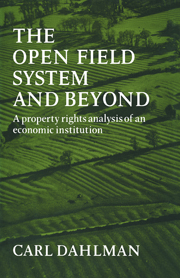Book contents
- Frontmatter
- Contents
- Preface
- 1 Introduction
- 2 Theories of the open field system
- 3 Property rights, transaction costs, and institutions
- 4 The economics of commons, open fields, and scattered strips
- 5 The economics of enclosure
- 6 Some extensions and generalizations
- Bibliography
- Index of names
- Index of subjects
4 - The economics of commons, open fields, and scattered strips
Published online by Cambridge University Press: 07 October 2011
- Frontmatter
- Contents
- Preface
- 1 Introduction
- 2 Theories of the open field system
- 3 Property rights, transaction costs, and institutions
- 4 The economics of commons, open fields, and scattered strips
- 5 The economics of enclosure
- 6 Some extensions and generalizations
- Bibliography
- Index of names
- Index of subjects
Summary
On the title page of one of his most renowned works, an eminent historian has placed the following quotation from William Blake : ‘To generalize is to be an idiot. To particularize is the alone distinction of merit.’ Even among contemporary historians, this general attitude towards historical research does not seem to be uncommon. Consequently, since we are about to present an abstract, theoretical model of the open field system, an apology or justification for the approach might be thought in order, for a great many toes will perhaps feel sorely stepped on. However, none will be given, nor is one really necessary. For what is to be understood by ‘generalizing’ or ‘particularizing’ is, of course, a matter of point of reference. What the historian had in mind when selecting the quotation from Blake as a motto was quite probably that, in historical research, general models are easy to come by, but exact explanations for the many variations of history are difficult to achieve. That may be the historian's way of looking at the problem, but it is not necessarily that of the economist. Unless, he would say, there is a theoretical model sufficiently precise as to explain, in a consistent manner, the general phenomenon, various accounts for particular events have not been shown to be relevant, for there is no common theme that has been understood so that the empirical ‘particularization’ can be justified.
- Type
- Chapter
- Information
- The Open Field System and BeyondA property rights analysis of an economic institution, pp. 93 - 145Publisher: Cambridge University PressPrint publication year: 1980



